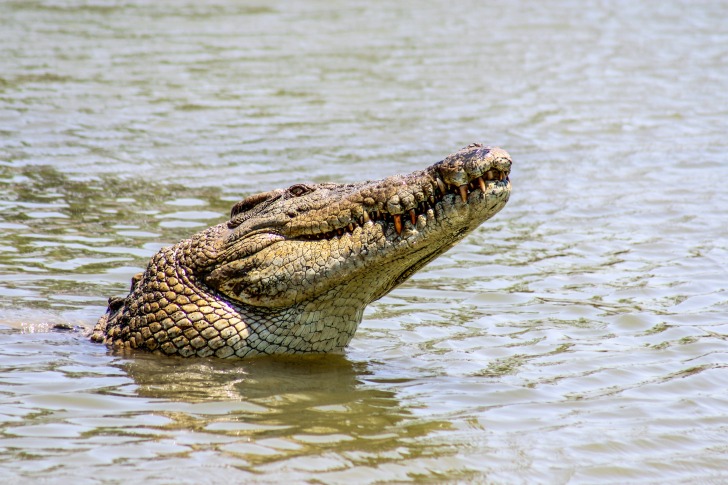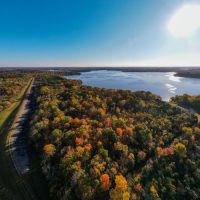Yes, you can find alligators in the oddest of places in Kentucky, and I don’t just mean in zoos.
Growing up in Georgia, alligators have always been in my backyard in the Okefenokee Swamp and the Southeast.
In the Southeast, including Kentucky, alligators and their cousins, the caiman has been known to scale a river upstream or to travel through water mains and pipes.
Finding an alligator in your toilet bowl or in the backyard swimming pool is not as impossible as finding a crocodile.

Contents
So… Are There Alligators in Kentucky?
OK, so first of all, alligators could live in Kentucky.
There is no reason that they can not be found in this state.
Let’s start with geography.
The state of Kentucky is in the southeast region of the US in North America.
Kentucky is north of Georgia, Alabama, and Tennessee and west of South Carolina.
The Bluegrass State, unlike those states, is not on the coast.
Cartographically, the state is shaped sort of like a slug, flat on the bottom and with two hills on the top.
The terrain is hilly, as well, with famous blue-green grasses rolling in the prairies.
Rural areas and poverty pockmark this state, which borders its east the Appalachian Mountains.
Waterways weave throughout the land, named for an Algonquian language, not to be confused with alligator language.
Here is where alligators can travel into Kentucky, through the channels and streams that feed the grasslands of this horse racing state.
The animals come by way of pet owners who decide to let loose their gators, and from Gator fans who may likely terrorize the Wildcats’ fans.
Alligators Traveling to Kentucky by Waterways and in the Wild
If an alligator were to get caught up in a creek and river system that leads north, or allows for a slow flow and movement north by the alligator–and the creature is hungry or needs to breed–they can make their way up to Kentucky.
It sounds crazy, but it’s true!
Transporting Live Alligators and Alligator Eggs to KY
As for other ways alligators travel to Kentucky, individuals who breed, purchase, or capture live alligators or eggs ready to hatch out alligators could theoretically transport alligator eggs or alligators to Kentucky and drop them off and they would most likely be able to survive.
There is concern about predators and finding a habitat suitable to survive in and another alligator to breed with.
Otherwise, the prospects of an alligator surviving in Kentucky would be slim but not impossible, just really, really difficult for the gator.
So, are there alligators currently living in Kentucky?
Yes, in zoos, captives as exotic pets, and in the wild.
However, alligators are not native or natural to the state of Kentucky.
Therefore, if you see someone with an alligator living in their backyard or swamp while in KY, this is not normal and should be reported to the authorities immediately.
Alligator Species in Kentucky
There is an American alligator at the Louisville Zoo, named King Louie and he is an albino, or all-white, alligator.
According to the Louisville Zoo, the natural habitat for the American alligator like theirs is “freshwater lakes, rivers, swamps and wetland areas” and these alligators live in the Southern US and Central America.
In the wild, the American alligator eats opportunistically.
That means they will eat anything that is within their feeding range.
This includes carrion, which is dead meat.
A dwarf caiman was found in Lexington, KY, but this is just a distant cousin to the alligator.
Caimans are small-snouted and less dangerous compared to an American alligator.
In the scientific lineage, caimans and alligators come from Alligatoridae.
The subfamily Caimaninae leads to the caiman, while the Alligatoridae leads to the alligator.
Finding a dwarf caiman is unusual, but it also shows that these reptiles can live successfully in this southern state.
In April 2021, KY news reporters state that the dwarf caiman found in the state probably had been a pet.
That is the typical reason why the police find wild animals that are exotic species on the prowl.
“Kentucky Fish and Wildlife occasionally receive reports of alligators and caimans in state waterways,” Kentucky Fish and Wildlife Conservation officer, Kyle Clark, said. “There are reasons why we have laws in place prohibiting the importation of exotic and inherently dangerous animals.”
The news report posted in June 2022 discusses the legal penalty for anyone who is caught with an alligator, crocodilian, or other reptile considered a non-native exotic species.
“Cornett was cited on June 23 and has been charged with illegally transporting and possessing an inherently dangerous exotic (non-native) animal, not reporting its escape to the Department of Fish and Wildlife Resources, and not having a permit or documentation for other exotic animals in his possession, according to a Fish and Wildlife press release.”
Is it Safe to Swim in Kentucky?
Yes, it is safe to swim in Kentucky.
All of the lakes, rivers, streams, and ponds are well maintained and free of alligators–for the most part.
You are not going to have to worry about finding gators or caimans, and especially not crocodiles, in the freshwater here.
There are no seas, which is one way that crocodiles, which are fresh and saltwater creatures, can travel farther than alligators.
Other concerns about swimming in Kentucky include swimming in super deep waters or rivers with strong currents.
If you are not a strong swimmer, you can get swept away in the current of a rushing and rising river.
Also, deep waters can have pulling vortexes caused by caverns hidden deep below.
Avoid swimming in unknown swimming holes, under bridges, or beneath waterfalls where rushing waters pool and create a strong force that can suck swimmers down where they drown.
As for a way to check out Kentucky waters before you swim to see if alligators have been sighted, there is hope.
Use this resource to find out in real-time whether a river, such as the Cumberland River, has been infested with alligators, so you can be safe when you swim.
Right now, the only concern for swimmers has to do with the quality of the water.
If you are susceptible to waterborne viruses or concerned about contracting bacterial infections through cuts or open skin, stay away from the water and swim at another time.
These are the only creatures that are causing problems for Kentucky swimmers, though, as alligators are not a current threat to public safety.
Interesting Alligator Facts in Kentucky
There is an urban legend about a supersized 19-foot-long alligator in Lake Cumberland, which is in Kentucky.
“Maybe “tail” is the better word when referring to the latest urban folklore legend that’s been circulating on the Internet about a gargantuan alligator swimming in Lake Cumberland and later killed by a game warden,” said Commonwealth Journal.
However, this is an urban myth that was circulated online and not really true or backed by real evidence.
The story continues, “We even sought assistance from a former reporter for the Commonwealth Journal.
Dave Baker, now a spokesman for the Kentucky Department of Fish and Wildlife Resources, with tongue firmly in cheek, responded:
“I hate to say that there are no alligators in Lake Cumberland. In addition, there are no black panthers in Kentucky, we do not drop rattlesnakes from helicopters into Kentucky forests, and the season is closed on Sasquatch (legendary BigFoot).”
Alligators vs. Crocodiles
The caiman and alligator are alligatorids.
Both species thrive in a temperate zone, such as the Southeastern US.
Meanwhile, the crocodile is twice the size of the four-foot-average length dwarf caiman, with crocs reaching 16 feet.
Alligators are the mid-range reptilian in this trifecta of sharp teeth.
Here’s how I determine if they are alligators or crocodiles–alligators and the Florida Gators in the US and crocodiles are in the Nile River in northern Africa.
There is one exception–per usual in life–and the Florida Everglades have both crocodiles and alligators.
This would be the key way that a croc could come loose and head north to Kentucky in a free-range style if they were hungry, let’s just say.
Also, caimans come from South America and Mexico and would rarely be seen naturally in Kentucky.
Supposedly, you can see the differences in the crocodiles, alligators, and caimans by looking at their snouts.
As for saltwater and freshwater, alligators prefer freshwater and crocodiles can live in just saltwater, depending on the subspecies.
Crocodiles can also live in freshwater and could share the waters with alligators and caimans.
But who would be doing that in the wild?
Not me!
Let’s just say, as Goldilocks would, the caiman is too small to be a crocodile, and the crocodile is too large to be either a caiman or an alligator.
The alligator is just right in the middle and the one you would most likely expect to see in Kentucky.
To date, there are no crocodiles inhabiting Kentucky.

3 Safety Tips for Swimming in Alligator-Infested Waters
- Update yourself with the latest state swimming advisories by the Division of Public Health Protection and Safety of the Energy and Environment Cabinet for the state. Right now there are no advisories regarding alligator-infested waters.
- Never swim alone. The University of Georgia SREL Herpetology Program states, “It is best to avoid swimming in areas that are known habitats for large alligators but at the least, never swim alone.”
- Avoid splashing the water. “To an alligator, a splash potentially means a food source is in the water…Always be careful around water. Splashing can attract alligators that think a prey animal is injured,” states the UGA SREL Herpetologists.
In Kentucky, where horse racing of expensive breeds is a popular sport, the jockeys have very little to worry about in terms of whether their horse will get eaten by an alligator.
A crocodile might be more likely to eat the horse–but the jockey would be a good fit for the alligator, to be honest!
Be cautious when sipping mint juleps around rivers is all I am saying because chances are slight but positive that an alligator could be lurking.
Kentucky Safety Overview
READ THE FULL REPORT: Kentucky Safety Review
Safety Index:
- OVERALL RISK: MEDIUM
- TRANSPORT & TAXIS RISK: MEDIUM
- PICKPOCKETS RISK: MEDIUM
- NATURAL DISASTERS RISK: MEDIUM
- MUGGING RISK: MEDIUM
- TERRORISM RISK: LOW
- SCAMS RISK: MEDIUM
- WOMEN TRAVELERS RISK: MEDIUM
Frequently Asked Questions
Should I be worried about alligators as a resident living in Kentucky?
No, you should not be concerned that you will be unwelcomingly greeted by an alligator on your way to work tomorrow if you commute to Kentucky.
Is there alligator gar in Kentucky Lake?
Yes, alligator gar lives in Kentucky Lake.
According to the Kentucky Department of Fish and Wildlife, there are five locations throughout the state of Kentucky where alligator gar live.
Keep in mind alligator gar are a type of fish that are not alligators, but “unique, torpedo-shaped fish that stems from a family of ray-finned fish that date back over 157 million years.”
What should Kentucky residents do if they see an alligator in their backyard?
Stay away from the animal and call 911 so that animal control can come and take it away safely.












Alligators can be found in Kentucky, mainly through pet owners releasing them or individuals transporting and dropping off alligator eggs or live alligators, but they are not native to the state.